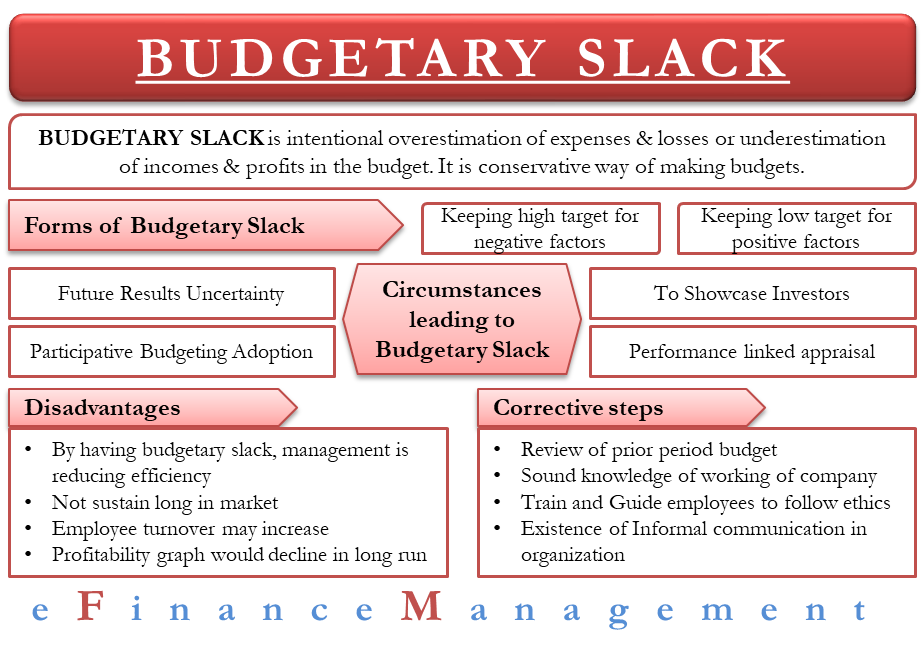What is Budgetary Slack?
Budgetary slack is the intentional overestimation of expenses & losses or underestimation of incomes & profits in the budget. The business contains a slack if the managers purposefully have set their targets easy than the estimated forecasts. Hence, it becomes very certain to achieve targets.
It is a conservative way of making the budget. Management creates a cushion in the budget so that the actual performance is higher than the expected performance.
A budget should be made ethically & honestly. It should be favorable to organizational growth. Budgetary slack is not a good practice because it misleads the stakeholders about true performance. Hence, Top managers should reduce it by taking serious actions.
Forms of Budgetary Slack
- Keeping low targets for positive factors. For example, management keeps small numbers for profits, incomes, productivity, employee retention, cash inflow, sales turnover, etc. So, when they meet the target, their performance seems like improving.
- Keeping High Targets for the negative factors. For example, management keeps large numbers for expenses, losses, employee turnover, cash outflow, and overheads. So, when the actual numbers are achieved less it, certainly it is beneficial for the company & is considered to be a good performance.
When does a Manager create Slack?
- Uncertainty: Managers become conservative when there is uncertainty in Future results. For example, when creating budgets for new product developments (NPD), new product mix, or lines. Hence, there is no past record of possibilities.
- Participative budgeting: When a firm uses a participative budgeting system, the budget becomes accessible to a large number of employees, so there is a certain chance that they serve their own best interest.
- Showcase to Investors: When managers want to show investors that the business is constantly beating its targets. As a result, it gains goodwill & better image.
- Performance appraisal: Management create slack if target achievement decides their appraisal. This gains their rewards& recognition in the firm,
- Compensation structure: Most companies adopt this; the cost to the company includes incentives based on target achievement in addition to the basic pay. So, management is likely to create slack for his own monetary benefits.

Disadvantages
Managements best competition is with itself. Hence, by keeping soft targets, it sets grounds for reducing efficiency. It will not sustain long in the market. Employees may probably feel that there is no growth in the firm & turnover may increase. IF such slack exists for consecutive years, Company will have declining overall productivity. In the long term, it will have a profitability graph going down.
Also Read: Limitations of Budgeting
How to Correct Budgetary Slack?
Management can review the prior years of budget to evaluate variances between actual standards & budgeted standards. It should have sound knowledge of the working of the organizations. It should participate in the budget-making process. Above all, it must train & guide the employees to follow ethical practices. There must be Good communication & informal relationships in the organization. Employees must consider business as their own.
When Managers do not Create Budgetary Slack?
Above all, when the performance appraisal system is not linked with the Targets, managers don’t intentionally keep slack. When only the top management makes budgets, since they have the best interest of the firm in mind, they do not engage in malpractices.
Unintentional Budgetary Slack
Sometimes there are ethical reasons to create budgetary slack, say there are major external changes forecasted. Management needs to hedge the risk of achieving easy targets. This happens in a year of major changes. The managements intention may not be to create slack, but it keeps the targets lower to match with the circumstances. Secondly, sometimes by mistake, managers estimate the wrong values. When it outpasses this, others are likely to feel that it was slacked. Though, they might have acted in good faith.


this is very good article.
I enjoyed to read it.